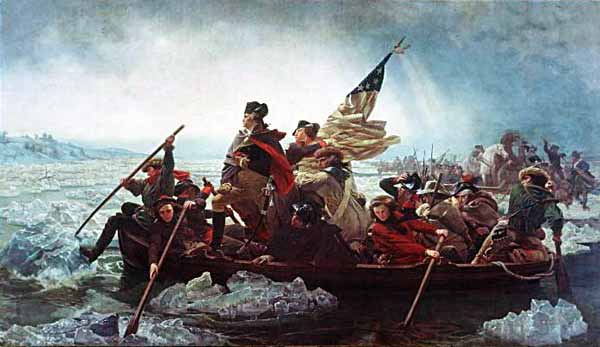George Washington (1732-1799) was the unanimously elected 1st President of the United States of America and the Commander-in-Chief in the Revolutionary War.[1] He was also a devout Christian, with his adopted daughter once stating that "if you question Washington's faith, you may as well question whether or not he was a patriot."[2]
Washington gave a great example of humility and lack of ambition by serving only two terms as president and then stepping aside. This came during a period where there was ambiguity as to whether or not the President should hold office for life. In surrendering his power, Washington sought to emulate the (few) positive examples of great leaders in Roman Republican history, emulating especially Cincinnatus, who similarly gave up absolute power to return to his farm. Lord Byron, the British poet, noted the similarity, and hailed Washington as the "Cincinnatus of the West."[3]
Washington bravely led the colonists in revolt against the unjust British government, and in its place established a new government. Fighting against the vastly more powerful British army, Washington lost nearly every battle in the American Revolution until winning at Trenton and Princeton, and then lost most battles afterwards until ultimately prevailing at Yorktown with the help of a new contingent of French troops.
Washington frequently invoked Christianity in his work. As General, he commanded that chaplains be included in every regiment: "The General hopes and trusts, that every officer and man, will endeavour so to live, and act, as becomes a Christian Soldier, defending the dearest Rights and Liberties of his country.[4]
Washington declared in his Inaugural Address: "It would be peculiarly improper to omit, in this first official act, my fervent supplications to that Almighty Being who rules over the Universe. No people can be bound to acknowledge and adore the Invisible Hand which conducts the affairs of men more than the people of the United States. Every step by which they have advanced to the character of an independent nation seems to have been distinguished by some token of Providential agency." Comments such as this one have led many modern scholars to conclude that Washington was in fact a deist rather than a Christian.[5]
On November 4, 1752, Washington was initiated into Freemasonry at Fredricksburg Lodge, Fredricksburg, Virginia. He was passed and raised at the same lodge, becoming a Master Mason on August 4, 1753. He later served as Worshipful Master of Alexandria Lodge No. 22 in Alexandria, Virginia. Upon his death in 1799, he was given a Masonic funeral at his wife's request.[6]
Parson Weems and the cherry tree story
In 1809, Mason Locke Weems (1756-1825), usually referred to as "Parson Weems," published a book entitled History of the Life and Death, Virtues and Exploits of General George Washington. This book contained many fanciful stories and half-truths, intended to present Washington as a larger-than-life figure. Perhaps the most famous passage in it is Weems' recounting of a story which he attributed to an unnamed "aged lady, who was a distant relative [of Washington], and, when a girl, spent much of her time in the [Washington] family:"
- "When George," said she, "was about six years old, he was made the wealthy master of a hatchet! of which, like most little boys, he was immoderately fond, and was constantly going about chopping everything that came in his way. One day, in the garden, where he often amused himself hacking his mother's pea-sticks, he unluckily tried the edge of his hatchet on the body of a beautiful young English cherry-tree, which he barked so terribly, that I don't believe the tree ever got the better of it. The next morning the old gentleman, finding out what had befallen his tree, which, by the by, was a great favourite, came into the house; and with much warmth asked for the mischievous author, declaring at the same time, that he would not have taken five guineas for his tree. Nobody could tell him anything about it. Presently George and his hatchet made their appearance. "George," said his father, " do you know who killed that beautiful little cherry tree yonder in the garden?" This was a tough question; and George staggered under it for a moment; but quickly recovered himself: and looking at his father, with the sweet face of youth brightened with the inexpressible charm of all- conquering truth, he bravely cried out, "I can't tell a lie, Pa; you know I can't tell a lie. I did cut it with my hatchet."—"Run to my arms, you dearest boy," cried his father in transports, "run to my arms; glad am I, George, that you killed my tree; for you have paid me for it a thousand fold. Such an act of heroism in my son is more worth than a thousand trees, though blossomed with silver, and their fruits of purest gold."[7][8][9]
(Notice that Weems did not represent Washington as calling it "my little hatchet;" that appears to be a "familiar misquotation.")
Sources:
- ↑ http://www.whitehouse.gov/history/presidents/gw1.html
- ↑ http://www.christiananswers.net/q-wall/wal-g011.html
- ↑ http://www.theotherpages.org/poems/2001/byron0101.html
- ↑ http://www.amerisearch.net/index.php?date=2004-02-22&view=View
- ↑ Id.
- ↑ http://freemasonry.bcy.ca/biography/washington_g/washington_g.html
- ↑ British spellings are as they appear in the original text.
- ↑ Weems, George Mason (1918), History of the Life and Death, Virtues and Exploits of General George Washington. Chapter 2: Birth and Education, online at University of Virginia]
- ↑ The Life of George Washington with Curious Anecdotes Equally Honourable to Himself, and Exemplary to his Young Countrymen. 1837, facsimile page images at Google Books
